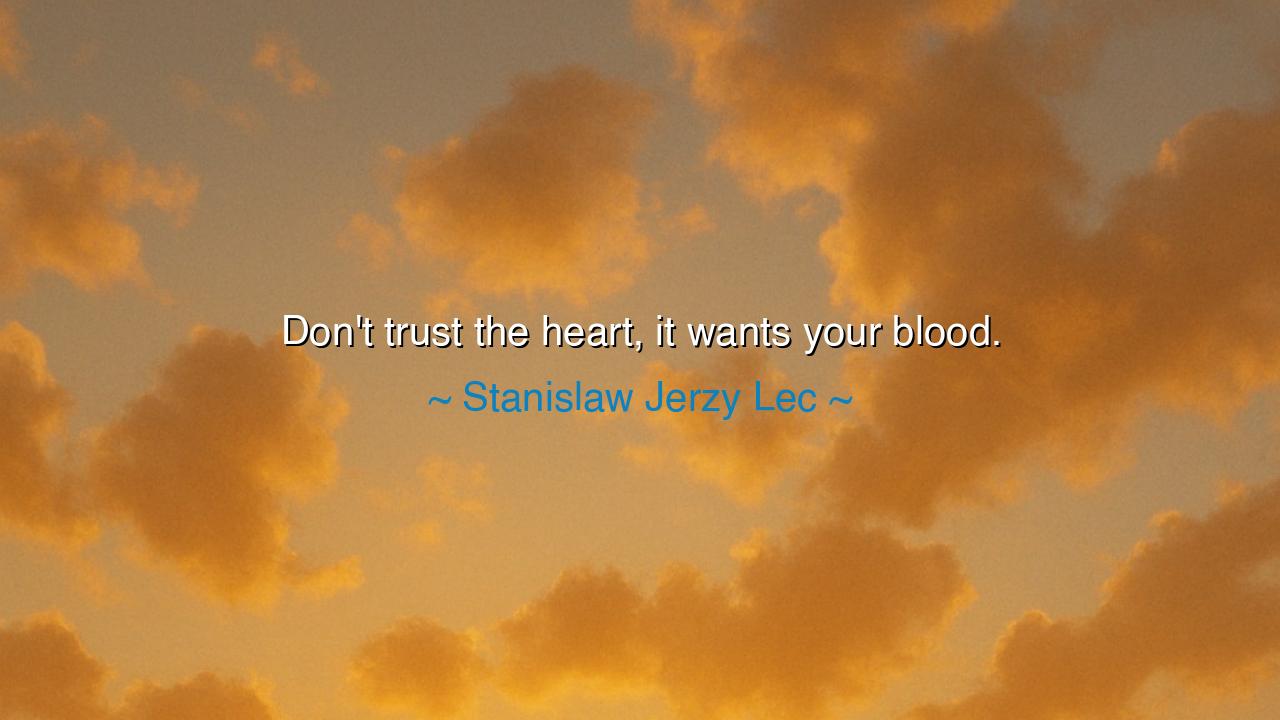
Don't trust the heart, it wants your blood.






Hear the dark yet piercing wisdom of Stanis?aw Jerzy Lec, who wrote: “Don’t trust the heart, it wants your blood.” At first these words strike the ear with shock, as if they were a riddle or a jest. But beneath their sharpness lies a truth profound: the heart, symbol of passion and desire, is not always a faithful guide. It calls out to us with longing, but its hunger can consume us. To follow it blindly is to risk being drained by the very fire that gives it life.
The origin of this quote lies in Lec’s life, a man forged in the iron furnace of twentieth-century Europe. A poet, satirist, and survivor of war, he knew too well that human impulses—though clothed in noble words—often led to ruin. In times of terror and cruelty, he witnessed men driven not by reason but by unchecked desire, whether for power, revenge, or fleeting pleasures. Thus he spoke of the heart not as the seat of wisdom, but as a devourer, forever demanding more. His words are a warning against the seduction of pure impulse, which promises sweetness but often brings destruction.
History confirms his teaching. Consider the tragic story of Cleopatra and Antony, whose hearts led them into passion and alliance. Their love was fierce, their loyalty to each other unmatched, but their choices—driven by desire more than reason—brought ruin upon both. Rome triumphed, and their dynasty fell. Their hearts, filled with longing, consumed them, demanding not only devotion but, in the end, their very blood. Here is Lec’s paradox made flesh: when the heart rules untempered, it can lead not to life, but to loss.
Yet Lec does not tell us to despise the heart, only to temper it. The heart is a mighty engine of passion, capable of love, courage, and compassion. But passion without balance can enslave. Just as the body cannot live if the heart drinks all the blood for itself, so too the soul cannot flourish if desire consumes all reason. The ancients taught the same: Plato warned that the soul must be governed like a chariot, with reason guiding the horses of passion and spirit. Lec’s biting wit gives this wisdom a sharper edge, reminding us that unchecked desire can be as deadly as a tyrant.
This teaching reaches even into our daily lives. How often do we hear the counsel, “follow your heart”? Yet how many tragedies have sprung from that very creed? To follow the heart blindly is to risk addiction, betrayal, financial ruin, or broken trust. The wiser path is to listen to the heart’s voice but weigh it with reason, to let desire be tempered by discipline, and longing be balanced by foresight. The heart is a fire: let it warm you, but do not let it burn your house to ash.
The lesson, then, is this: be wary of blind passion. Do not surrender wholly to every longing, every impulse, every desire. Instead, cultivate discernment. Ask yourself: does this desire build life, or does it drain it? Does it lead to freedom, or does it enslave me? In this way, you do not silence the heart, but bring it into harmony with mind and spirit. For true wisdom is not to extinguish passion, but to guide it rightly.
Therefore, remember Lec’s warning: “Don’t trust the heart, it wants your blood.” Hear it not as a rejection of love or passion, but as a call to vigilance. The heart will always hunger, but it is your task to decide how to feed it—whether with wisdom and patience, or with folly and destruction. Guard your blood, guard your life, and let your heart serve you, not consume you. In this balance lies strength, and in this strength lies the path to a life not wasted, but fulfilled.
–––






TNTuyet Nhung
Lec’s statement almost feels like a warning to be cautious about following our emotions blindly. The idea that the heart wants your blood suggests that emotions can consume us if we’re not careful. But can you ever truly separate the heart from rational thought? Is it possible to live fully without embracing your emotions, or do we risk becoming too detached and cold if we ignore them?
BTThu Bui T
I feel like this quote raises an important question about self-control. If the heart wants your blood, does that mean our desires are inherently selfish or destructive? Maybe Lec is pointing out that unchecked emotions or passions can cause harm if we don’t temper them with reason. Is it possible to balance the emotional 'heart' with rational thinking to avoid self-sabotage?
ANAnh Nguyen
This quote gives me a bit of a cynical view on human nature, especially when it comes to following our hearts. It almost seems like Lec is suggesting that the heart is deceptive, only seeking what it desires without considering the consequences. But is that fair to say? Couldn’t the heart also represent love, compassion, and the pursuit of meaningful connections? Is it really as selfish as Lec suggests?
HPhy P
Stanislaw Jerzy Lec’s quote makes me think about the internal conflict between reason and emotion. If the heart really wants your blood, is it essentially saying that our desires can drain us? Does following the heart always lead to personal sacrifice, or can it bring fulfillment without the consequences? I wonder how much we should trust our emotions when making important decisions in life.
TSNguyen Thi Thu Suong
This quote feels a bit harsh but intriguing. It seems to suggest that the heart, symbolizing our emotions and desires, can lead us astray, pushing us toward things that aren't necessarily in our best interest. But isn’t part of being human about following your heart, even when it feels risky? Do you think Lec is warning us about blind passion, or is he speaking about the darker side of unchecked emotions?